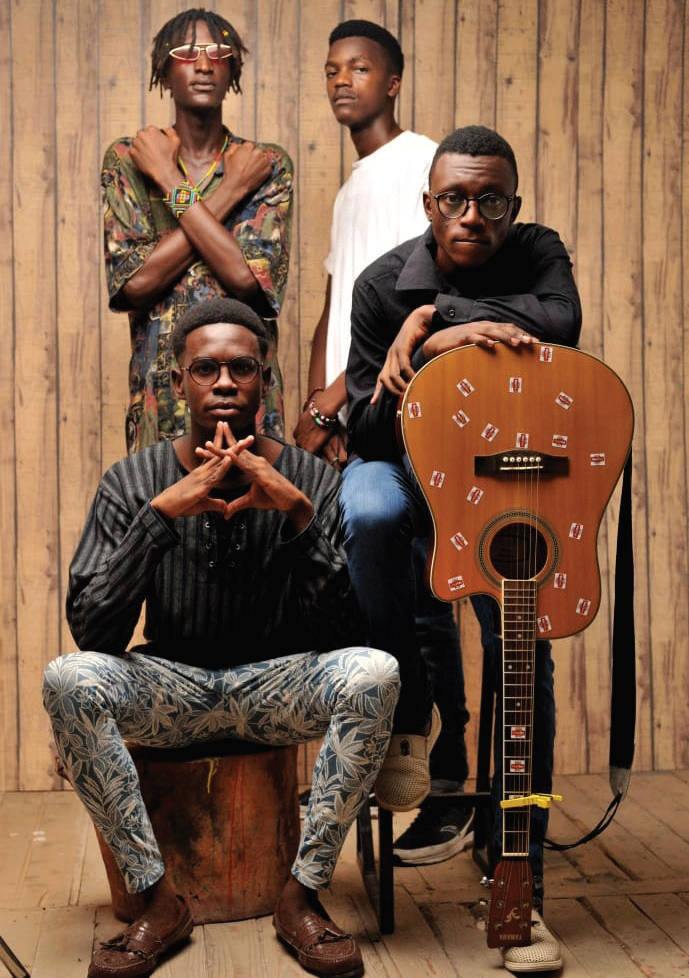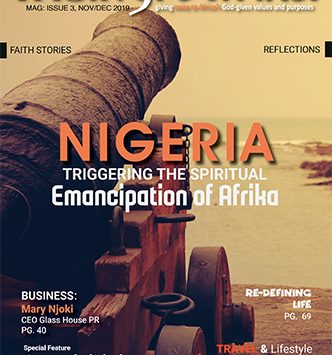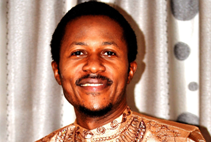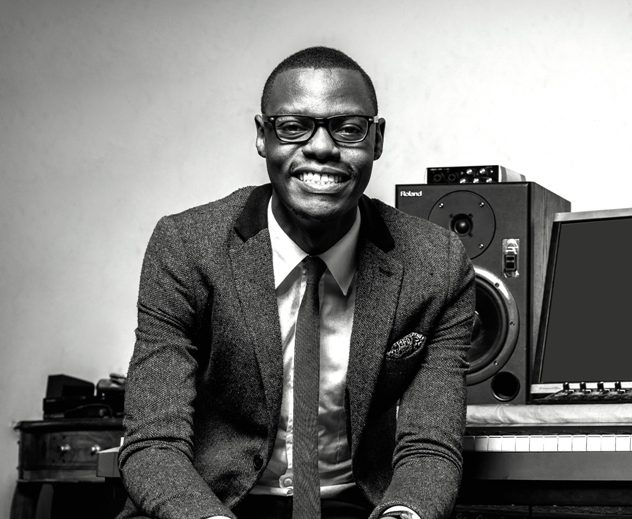Other Arts from Afrika

Passionate about getting God's message concerning Afrika and the end…
AFFILIATED
Afrika, Brotherhood and Arts

Quentin (22), Moses (24), Mark (21) and their manager Warris (22) from the group ‘Affiliated’ gave us insights into their journey and passion for spoken word poetry. Their instrumentalist, Dougie, joined us at the very end but his value to the group was very evident. Affiliated are students of journalism, broadcast journalism (Quentin) and pharmaceutical technology (Moses), they have literally pulled themselves up by sheer determination. Their talent, dedication and message have earned them respect in their circles and they have a debut album, ‘Doh ya fare na ndoto’ (money for busfare and dreams) in the works.
Tell us about ‘Affiliated’. How did it start? Why is it called ‘Affiliated’?
Quentin: Affiliated means we are linked to whatever we are doing and we are also linked together as brothers. Affiliated started way back in 2016 when we joined the university as a dance crew!
Moses: We had dope moves but then there was a competition held here at school, and we lost, and we don’t really like losing, so we decided to venture into another field where we can win.
How did it lead to spoken word?
Quentin: When we were dancing, I was doing spoken word part-time, though I wasn’t sure about it, but then, slowly after the dance started fading away, the spoken word started coming out. Then everybody came on board, until where we are today. It’s been a journey. 3 years.
So you haven’t given up, which means you’re either winning competitions or you’ve found something in this?
Moses: Yes, there is something in this. A person like me, I come from somewhere remote and I really wanted to change what I see around there, but I didn’t know how to exactly. But when I started venturing into word, it opens up your mind to all this.
Quentin: What spoken word gave me is freedom, because personally I have been weak in speech but through spoken word I can speak in front of masses without shaking but initially I couldn’t.
Mark: I joined this group later. I was a friend to Quentin and Moses and Warris. I could write but not perform, so these guys motivated me a lot. I said this is what I want to do. It boosted my confidence, even my writing. That’s how MarkMyWords came about.
What drives you?
Quentin: There is a saying, “Discipline keeps you where talent takes you” and so what keeps us going is the discipline. When we ventured into spoken word and saw the opportunities it had, we decided to venture into it professionally. We are brothers; we work by the code of brotherhood. We keep each other on track and the things we see daily inspire us to do it, to talk about the things that are happening.
Mark: Love. I love what I do, I love poetry and I love stories.
What do you talk about?
Moses: Generally, we talk about politics, corruption and the way people mis-run institutions. For example we have a piece about sports and how there is mismanagement in Kenya.
Mark: I write on three bases. I write on what I believe in, what I see and what I hear. If I see people like probably in Mombasa getting killed, I write about that, that’s a story I tell people about that. I can tell people about religion, somebody can get a story out of that.
Quentin: Sounds of revolution.
How would you summarize your message?
Quentin: One thing we always have as the main message is that love will rescue us. We simply tell people to love one another. We want to reawaken their mental senses, because right now we live in a society where rules are there but nobody is following them. It’s like a vehicle and potholes, we’re shaking. So we’re trying to tell people to take it easy.
Mark: Our message hits everyone in the society.
How is the message being received?
Moses: I think the message is driving home, because if I create an event and people turn up that means that they really want to hear my piece of mind.
Quentin: I could also say that the message has been received in equal measures. When somebody tells me I was inspired by your piece then it really blesses me as a writer because what I wanted to achieve I have achieved it.
There are lots of young people walking away from the Afrikan aspect of arts, performances and all that. What do you guys think about that?
Warris: I am a deep follower of music, of Afrikan culture. What I think the problem is that a lot of people want to embrace what’s hot, what’s going to sell them internationally, erroneously being told that what is Afrikan doesn’t sell. A lot of people want to have a style that brings money fast, they do not want to conserve what is ours they want to go with what’s popping: sex, nudity and obscene language which is not Afrikan.
Spoken word is pretty new in Kenya, people who are doing it are few and the money is not that much. Spoken word is a very conscious form of art, and there’s a threshold for you to do spoken word, you have to have a message that is strong, that is packaged artistically.
I believe spoken word is not new in Afrika, it always existed in the form of oral arts, though maybe now it has been reintroduced in a new form but is something we always had.
Warris: I think you’re right because you see recently for us those who were born after independence we found poetry that was written, but before that there were narratives. I was in drama in high school, you go to tell a story with actions and emotion and deliver it to people like the old form of storytelling. I think that is what is being rekindled by poetry but now we’re bringing it mainstream where I can package it and sell it to a western educated audience and still make a living out of it. It’s growing.
Art with our forefathers didn’t begin with a thought towards rewards. They did arts, poetry, music for community unification. Would you say that the quest for payment has watered down the originality of Afrikan arts?
Warris:The landscape changed a lot. Economically before these people came, we were stable, so someone could afford to do art as entertainment, but even then there were musicians, people who were doing it as a standing thing. I always like to say, if your art is based on originality of passion, not just money, it is going to make you money. The world we live in, you need money to reach more people. Maybe there are people who are going overboard but there are still artists who are really about the message, who are about being an artist for the calling of it, for the spirit and that’s who we try to be in Affiliated.
Quentin: Commercialization of art to me is something I can’t refuse, that’s where we’ve gotten to as a society. I need money to produce the songs, so I have commercialized my art because I have invested in it, but the money should never be the priority in the first place. If what you’re selling is good, I believe it will sell itself you don’t even have to go down with the hype.
How deep does this fire go, or is it just a passing phase?
Quentin: We are planning on taking this full time, but that doesn’t mean letting go of other things, you can multi-task, but art is the core.
What do you guys have as advice for young guys like you on how to deal with the circumstances and situations that come with being an artist and being a poet, based on your own experiences?
Moses: I would just tell them, trust your instincts, whatever happens around you, just try to keep the real you, don’t let these situations change you.
Quentin: Art is something divine, music is something divine, so you always have to be in the zone and if you go out of the zone it’s because of your own doings, find your way back.
Mark: You have to believe in yourself. You will get messages that you can’t do this… but if you’re going to fall for that message that you can’t do it… it will never work. And one thing as an Afrikan, Quentin told me, in anything you do you must incorporate culture in it.
Mark: Believe in you, embrace culture.Believe in God!
Quentin: Culture is the backbone of us as Afrikans, so the moment you let go of culture is the moment you lose yourself, you lose your Afrikanism. It’s not just about color, it’s about the things you do, the things you practice so in anything you do, man, let culture be the rubberstamp. Culture should be the base of whatever you’re doing.
What's Your Reaction?
Passionate about getting God's message concerning Afrika and the end times to the world, in order to heal, restore and rebirth Afrika to her true purpose and destiny in God.

















